Bangladesh relief efforts expand amid devastating floods
BRAC’s relief efforts continue as dire flooding in Bangladesh keeps millions stranded. Discover the latest on our Bangladesh flood relief.
BY SARAH ALLEN
Afrin Jahan’s life turned upside down when a sudden flash flood swept through her village, Porkora. Midday on Thursday, August 22, the roof of her fragile home collapsed under the force of sudden rising water. She was left with no alternative but to evacuate — fast.
The news from Bangladesh is harrowing. The worst flooding in three decades has claimed at least 27 lives, and left 1.2 million families stranded. And 5.6 million people are in dire need of help.
Some of the people we’ve met have lost everything — homes, crops, livestock. Others have remained in homes with knee-deep water. Too many are stuck in communities that are entirely cut off from aid, as flooding ruins roadways.
Afrin says she was terrified. Totally unfamiliar with such a situation and gripped by panic, her only concern was her children’s safety. Desperate to protect her two-month-old baby girl, she wrapped her in a plastic bag to shield her from the floodwaters. Holding her nine- and four year-old children tightly, she waded through the water to a nearby madrasa, where other families also sheltered. Exhausted, malnourished, and traumatized, Afrin now confronts an uncertain and precarious future.

As women like Afrin grapple with one of the most severe flash floods in decades, BRAC is scaling up its relief efforts amid damaged infrastructure and a disrupted mobile network.
In addition to the immediate needs, long-term needs are mounting. The floods have caused extensive damage to the region’s agriculture, with over 840,000 acres of crop fields under water. The livestock and fisheries sectors have suffered losses amounting to $167 million, deepening the economic blow to communities already struggling to make ends meet.
The immediate needs of the affected population remain critical. BRAC’s first responders say that people urgently need temporary shelters; food, including baby food; safe drinking water; emergency medical support; hygiene kits; and food for their livestock.
Support families hit by the flood emergency.

BRAC’s response: Bangladesh flood relief
BRAC has mobilized extensive resources, allocating $250,000 of its own funds and deploying a team of 5,000 local staff to deliver life-saving relief. Moving by boats, tractors, trucks, and even by foot — often wading through waist-deep water — our staff are dedicated.
“My colleagues and I heard that a very remote area nearby, Satbaria, had not had relief,” notes Rima Akter, a BRAC worker in Comilla. “So, we collected 800 packets of relief items, and on Friday, we rushed there. The affected area is all under water. We got right in the water, and delivered BRAC relief from door to door. From dawn till night, Friday and Saturday, we brought help to the endangered people. The people were so happy to see us. It is the best feeling to help them.“
BRAC has deployed seven medical teams, including seven medical officers and 21 paramedics. Working across five severely affected districts, these teams are providing urgent health care services.
BRAC has distributed 35,000 dry food packets to affected families, with a goal to reach 50,000 households with food support. BRAC is also delivering 2,250, ten-liter jars of drinking water in Cox’s Bazar. And a River Osmosis mobile water treatment plant has been transferred from Cox’s bazar to Mirershorai, to provide safe drinking water.
Recognizing the critical need for hygiene products, BRAC is also distributing 13,230 sanitary napkin packets, made possible through a partnership with Square Toiletries.
In Lakshmipur and Moulvibazar, BRAC will distribute over 15 tons of cattle feed to support local farmers.
BRAC has also launched a rapid needs assessment to ensure that additional assistance is provided where it is most needed. To keep communities informed, life-saving awareness messages are being broadcast through three community radio stations.

Flood appeal: How you can help
With the help of our generous donors, we’re making real progress to support families in need: But the scale of the disaster means that the need for support is far greater.
Your support can make a significant difference in the lives of families impacted by these devastating floods. Join us in our relief efforts by donating to BRAC’s emergency response fund.
Every contribution, no matter how small, can help provide essential supplies and services to the millions of people who need them most.
The people of Bangladesh are resilient, but they need our help now more than ever. Together, we can ensure families receive the aid they need to rebuild and recover from this catastrophic event.
Global appeal for Bangladesh flood donations
BRAC has launched a global appeal for donations to support families as they navigate the crisis. Make your secure online gift to support people in need today. Donors based in Bangladesh can make donations here.
- $635 will help a family rebuild their house
- $340 will help repair a damaged tube well
- $340 will aid the reconstruction of a latrine
- $20 can support a family’s most basic needs for two weeks
Sarah Allen is Communications Manager at BRAC USA.
Story Statistics
2,345 Reads
80 Shares
320 Likes
Related Stories
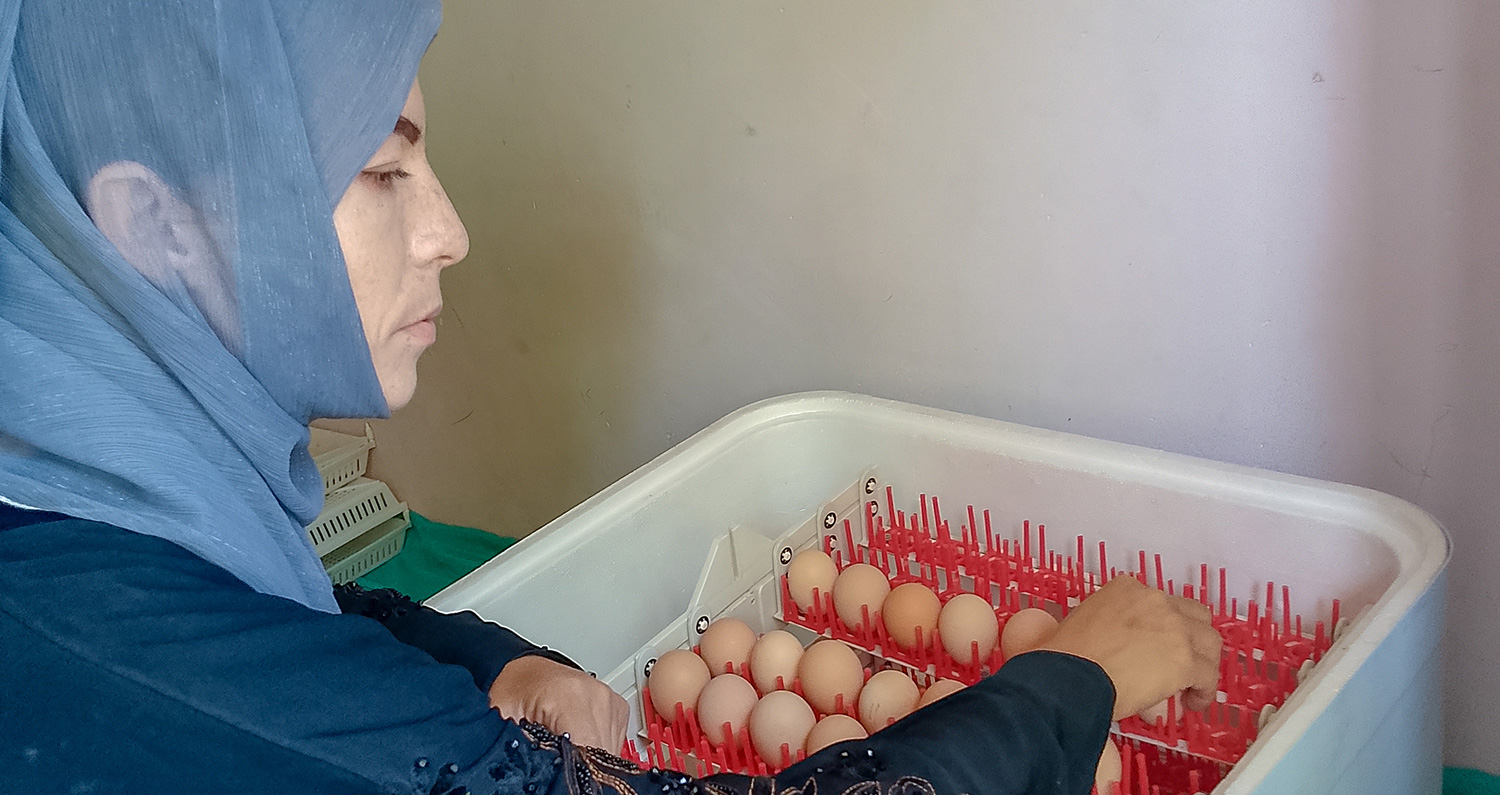
10 months ago
Incubating hope: Khadija’s story of resilience from Afghanistan
When 21-year old Khadija lost her father, her family lost everything. Two years later, she has built a thriving business raising chickens.
BY BRAC AFGHANISTAN
Two years ago, Khadija, a 21-year-old from the Dehdadi district of Afghanistan, faced a life-altering tragedy. The sudden loss of her father, the sole breadwinner of the family, left Khadija and her family helpless. As the oldest of three children, Khadija’s two younger brothers, aged 11 and 16, and her mother, were depending on her. With limited education and few opportunities in Afghanistan, Khadija felt the weight of her family’s future resting on her shoulders.
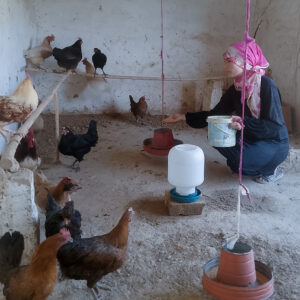 Desperate for a way to support her family, Khadija was determined. She sought help from neighbors and friends, but nothing resulted in a stable income for her family.
Desperate for a way to support her family, Khadija was determined. She sought help from neighbors and friends, but nothing resulted in a stable income for her family.
In October 2022, a glimmer of hope arrived when BRAC launched a livelihood project in Afghanistan and invited Khadija to participate. Through a comprehensive 36-day training program, she learned how to rear chickens and use an incubator to help eggs hatch. The training helped Khadija build her technical skills, expand her knowledge, and boost her confidence.
After the training, Khadija received an incubator, a battery, solar panels, wiring, a lamp, switches, feeding and water bowls, chick feed, and $1160 in cash to help launch her own poultry farming venture. Equipped with these resources, Khadija embarked on her journey as an entrepreneur raising chickens.
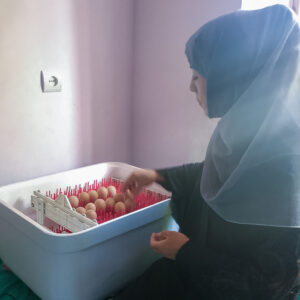 Khadija’s incubator, with a capacity for 96 eggs, has yielded an excellent success rate: She hatches an average of 90 chickens in a cycle, which typically takes around 36 to 40 days. Since launching her business, Khadija has raised nine cycles of chickens: more than 800 chickens in about a year. She sells about 60 chickens per cycle, earning her a net income of 3500-4000 Afghani (approximately $50 USD) per cycle.
Khadija’s incubator, with a capacity for 96 eggs, has yielded an excellent success rate: She hatches an average of 90 chickens in a cycle, which typically takes around 36 to 40 days. Since launching her business, Khadija has raised nine cycles of chickens: more than 800 chickens in about a year. She sells about 60 chickens per cycle, earning her a net income of 3500-4000 Afghani (approximately $50 USD) per cycle.
Khadija raises the remaining chickens herself, providing her family with a steady supply of eggs and a critical source of protein. Her chickens produce at least a dozen eggs daily, and after setting aside a few eggs for her family’s consumption, she sells her surplus at the local market. She sells 8-11 eggs per day for around 8 Afghani ($0.11) each, further boosting her income.
From having nothing to building a thriving business at the age of 23, Khadija’s transformation is truly inspirational. With her hard-earned money, Khadija is successfully supporting her family as its primary breadwinner, enabling her to purchase items like carpets and kitchen tools for their home.
Khadija now dreams of expanding her poultry business, aspiring to greater success and a lasting impact on her family’s future. She is determined to continue her journey of resilience. From a place of despair, she has transformed into a pillar of strength for her family, lighting the path to a promising future.
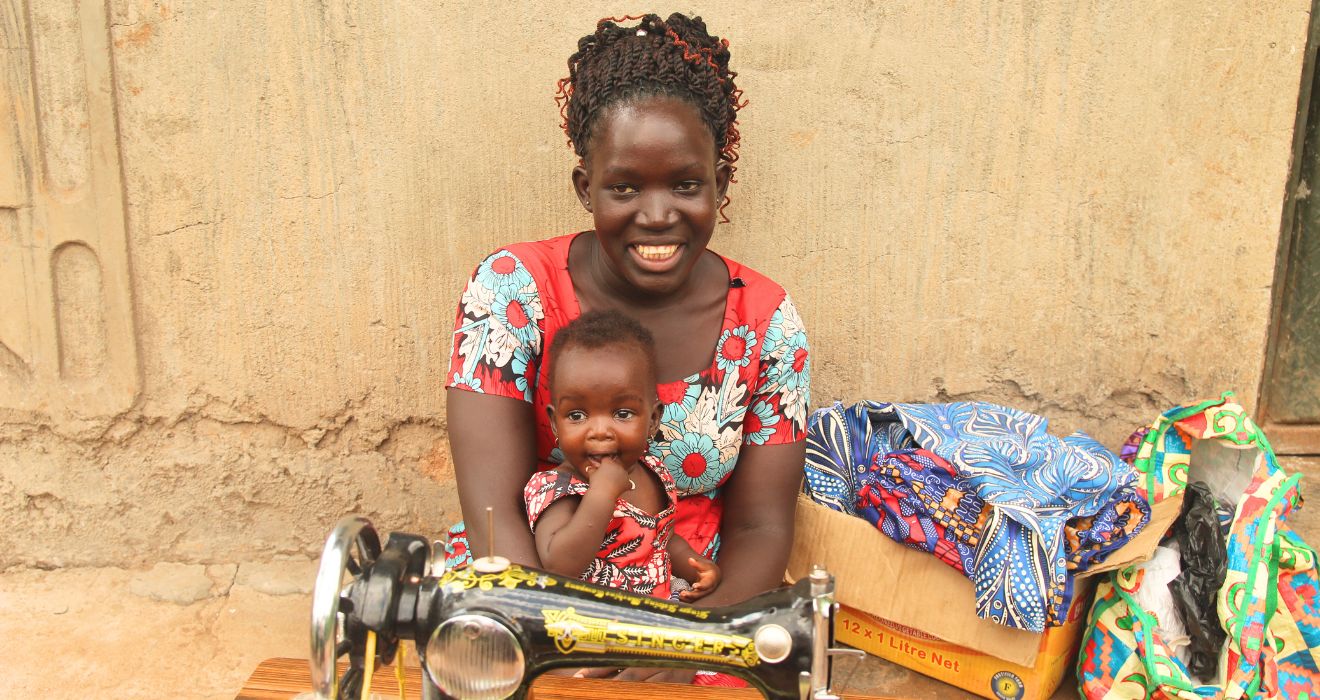
10 months ago
World Youth Skills Day: Lonah stitches skills for a new future
Lonah is one of thousands of girls in Uganda who are gaining business, livelihood, and life skills. On World Youth Skills Day, discover how she’s using these new skills to build a business and rewrite her future.
BY SARAH ALLEN
 At just 21 years old, Lonah is a mother, small business owner, and the breadwinner of her family. Her family of three — herself, her spouse, and her baby, Verena, just seven months old — lives in Luwero, Uganda, where they rent a modest home.
At just 21 years old, Lonah is a mother, small business owner, and the breadwinner of her family. Her family of three — herself, her spouse, and her baby, Verena, just seven months old — lives in Luwero, Uganda, where they rent a modest home.
Lonah moved to Luwero from northern Uganda in late 2020, and when she first arrived, she felt isolated. As an outsider coming to a new place amid a pandemic, she didn’t have any friends in her community.
She also had no income of her own: she primarily spent her time caring for the home, while her husband sold pineapples in the local market.
But last year, everything changed when she joined a youth empowerment club with other young women in her community.
“My friends almost doubled!” she shared gleefully. Lonah made many new friends and, importantly, gained a community of young women her age facing similar experiences.
Each Friday at 3:00, Lonah would walk to the clubhouse in her community, just a few steps away from her home. At the time, she was already pregnant with Verena.
The club became a safe space for Lonah amid her peers and a near-peer mentor, many of whom were pregnant or had young children, too. They sang songs, danced, socialized, and learned about critical topics like sexual and reproductive health and gender rights.
“There are teachings as women that we are usually told. But in the clubs, we learned all about topics like family planning, balanced diets, and child abuse.”

The girls also learned about budgeting, saving, and entrepreneurship. Lonah, who had always been interested in fashion, was interested in becoming a tailor: so BRAC connected her with a vocational training program to learn sewing. She also gained a critical tool to launch her business.
“I got this sewing machine here from BRAC; something I never imagined getting in my life,” she shared while beaming at her prized possession.
Lonah is just one of over 70,000 girls who participated in the program last year — Mastercard Foundation Accelerating Impact for Young Women (AIM) in partnership with BRAC — and this year, another 200,000 girls joined her. By the program’s end, nearly a million more adolescent girls and young women ages 12-34 will gain life skills and age-appropriate entrepreneurship and employment opportunities.
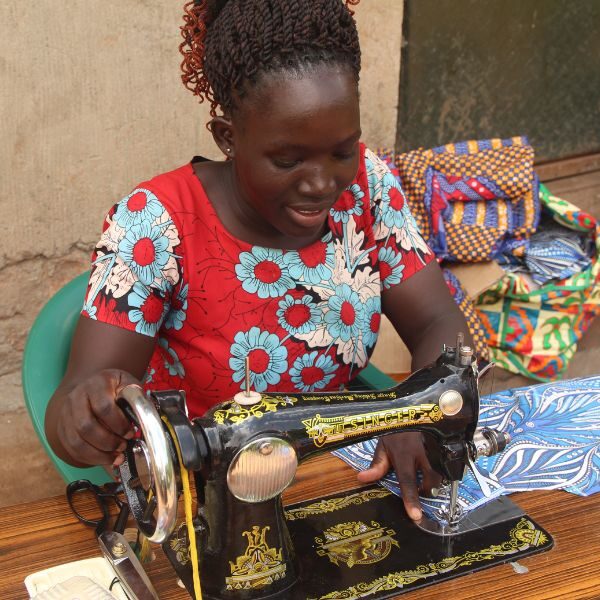 Since participating in the tailoring training, Lonah’s business has taken off. She has begun to attract more customers, and she is receiving plenty of custom orders. Her tailoring business has become her family’s main source of income.
Since participating in the tailoring training, Lonah’s business has taken off. She has begun to attract more customers, and she is receiving plenty of custom orders. Her tailoring business has become her family’s main source of income.
“My quality of life has changed. I am also saving even more than I used to save last year.”
Lonah’s family is no longer on a restrictive diet: They can buy all the nutritious food they need. “Before, I used to buy smaller food, which my family shared once a day. Now, sometimes I eat and I almost feel like dying because I am so full!”
Running a business while caring for her household and family is challenging: Lonah’s long day starts with caring for her daughter and preparing food for breakfast and lunch while her husband goes to work. Then she pulls out her sewing machine. On a typical day, she sews clothes until dinner time, making about three children’s dresses or one and a half shirts or dresses for adults. Finally, she prepares dinner, cleans the home, bathes her daughter, and puts her to bed.
Lonah describes herself as a people pleaser: She loves to do things for others, including her family and friends. “I am working so hard so that I can have my own home and so that my child can be happy.”
But she still makes time for fun: “Once everything is done at work, if I want to be happy, I like to go and visit friends and we love to eat, drink, and have fun together.”

Lonah is determined to expand her business. One challenge she’s facing as a new business owner is limited capital. So far, she has completely bootstrapped her business without significant investment capital beyond the money she has diligently saved.
But as her business grows, her needs are changing. Sometimes, when customers come to place an order, she does not have the color of fabric they want in stock, but she has already invested her money into other fabrics. She is excited to take a loan from BRAC’s affordable microloan offerings so that she can stock more fabrics, attract more customers, and take on more orders.
Lonah also wants to rent a larger home or a separate room to accommodate her growing business. Currently, she sews right outside of her rented home, because there’s not enough space inside for her to sew with her machine. When the sun is hot or the rain is pouring, she is forced to work through it, or lose out on valuable hours of work.

She dreams of having a storefront where customers can all come in and shop, and where she can work indoors no matter the weather. She’s already a fashion designer, but she wants to continue allowing her creativity to flourish and become a fashion inspiration for others. “I want to be a fashion designer, so that I can even dress brides and grooms!”
Although Lonah and her peers have graduated from their local AIM club, she continues to keep in touch with the girls who have become her closest friends. Her business is continuing to expand, and Lonah continues to set aside more money each week to save for her goals. She has even doubled her savings rate since graduating from the AIM program!

“I want to keep some money so that when my daughter starts going to school, I have the money,” Lonah said. “I also don’t want to be renting: I want to build a home for my family by the time she starts school.”
Lonah is well on track to achieve her dreams.
Sarah Allen is Communications Manager at BRAC USA.
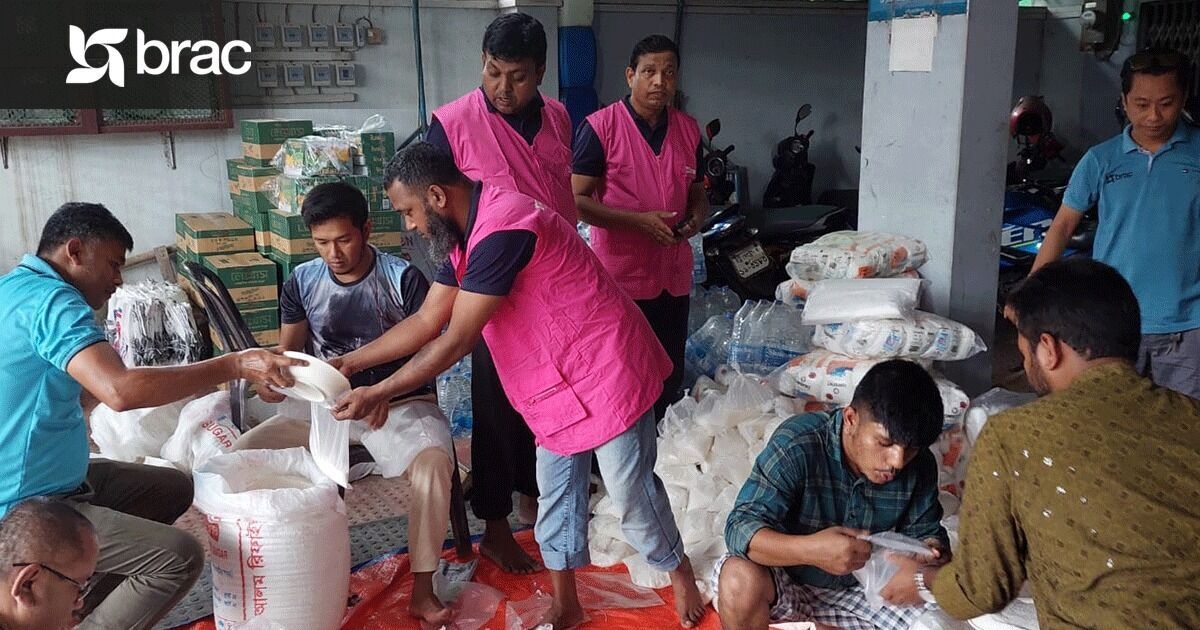
10 months ago
BRAC responds as catastrophic floods strike Bangladesh
BRAC teams are responding to support families impacted by catastrophic flooding in Bangladesh.
BY MICA BEVINGTON
In Hathazari, Chattogram, in southern Bangladesh, emergency relief teams are shoulder to shoulder, preparing relief kits for 500 families trapped by floodwaters. The families are sheltering in nearby buildings, including schools.
Bangladesh has been hit by a catastrophic disaster.
BRAC has deployed 5,000 field staff in response to some of the worst flooding in the country’s history. Teams are encountering acute needs amid floods that stretch dangerously across 11 districts. At least 15 people have lost their lives, and almost 900,000 families are reported to be trapped by floodwaters.
People need help evacuating to safe places, and temporary shelter items, such as tents. Other needs include dry food and drinking water, medical support, menstrual hygiene kits, water purification tablets, and food for livestock.
“In the past 38 years, the people of this region have never faced such catastrophic flooding, nor witnessed floodwaters rising to these unprecedented levels,” says Khondoker Tawhid, Program Head of BRAC’s Disaster Risk Management Program. “Thousands of individuals in remote and inaccessible areas remain stranded, many of them forced to seek refuge on the rooftops of their homes. The urgent priority is to evacuate these individuals to safe shelters and provide them with essential food and water. However, our field teams are encountering significant obstacles in communicating with flood victims and delivering aid, as road networks are entirely submerged, electricity has been cut off, mobile networks are disrupted, and there is a shortage of boats.”
In Khagrachari, BRAC is taking boats house to house, delivering food, safe water and essential medicines.
“The weather forecast for Feni shows the situation is hopefully going to improve — but even if it does, the need for longer-term recovery and rehabilitation is going to be massive,” Asif Saleh, Executive Director of BRAC Bangladesh, wrote on LinkedIn. “Bangladesh will need to stand united.”
BRAC offices have been inundated with water. Twenty offices, and six informal education centers are damaged.
Tawhid’s teams are undeterred. He says, “Despite these critical challenges, we are committed to providing lifesaving support — distributing dry and cooked food, water, and other essentials to those we can reach. To date, we have provided assistance to over 9,000 families with food and water. Our efforts will continue, focusing on food distribution, shelter reconstruction, water and sanitation initiatives, and livelihood restoration as soon as conditions allow.”
BRAC has released approximately $250,000 of its emergency reserve funding to power the first phase of its response. So far, teams have distributed 8,500 packets of dry food, and are working on ways to support medium and long-term rehabilitation efforts for those affected.
Global appeal for donations
BRAC has launched a global appeal for donations to support families as they navigate the crisis. Make your secure online gift to support people in need today. Donors based in Bangladesh can make donations here.
- $20 can support a family’s most basic needs for two weeks.
- $635 will help a family rebuild their house.
- $340 will help repair a damaged tube well.
- $340 will aid the reconstruction of a latrine.
Mica Bevington is Director of Communications at BRAC USA.
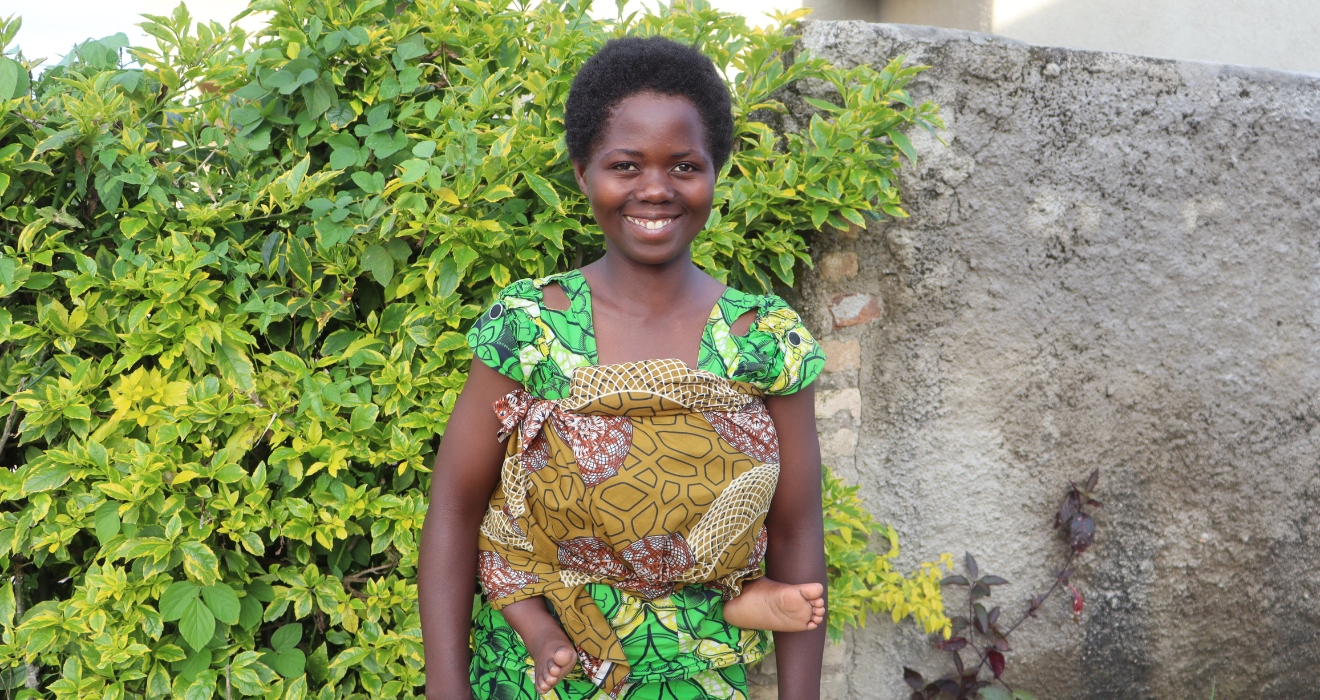
10 months ago
International Youth Day: Angelique finds her stride in Rwanda
As we celebrate International Youth Day — a day dedicated to the boundless potential of young people — we turn the spotlight on Angelique, who is building friendships and planning for a brighter future in Rwanda.
BY MEGHAN MCLAUGHLIN
Originally from Rwanda’s Eastern Province, 24-year-old Angelique moved to the Southern Province with her husband, Francois, and their two-year-old daughter, Scovia, in search of new beginnings.
Angelique hoped this new start would open doors for her family. When Angelique was young, her path was filled with challenges. She had to drop out of secondary school due to financial hardships. Without health insurance, she couldn’t access the care she needed when she fell ill.
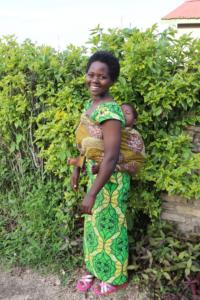 Despite taking on jobs as a casual laborer, Angelique struggled to make ends meet, and financial independence seemed out of reach. With no steady income or family and friends nearby for support, she felt isolated and increasingly uncertain about her future.
Despite taking on jobs as a casual laborer, Angelique struggled to make ends meet, and financial independence seemed out of reach. With no steady income or family and friends nearby for support, she felt isolated and increasingly uncertain about her future.
Everything changed when she joined her local youth empowerment club through Mastercard Foundation Accelerating Impact for Young Women in partnership with BRAC (AIM). Here, Angelique learned the value of saving and gained access to financial resources. She now earns around 1,000 Rwandan Francs from casual work and saves 200 Francs each week in her local village savings group.
“I always had to ask my husband for money, even to buy salt,” she recalls. “I didn’t know about savings, but now I save a portion of my earnings,” she says, beaming with pride.
The club also taught Angelique about family planning and preparing for the future, helping her focus on her daughter’s education and better living conditions. The most transformative aspect was the sense of community she found with friends and a mentor who share similar challenges. Now she has a support network of young women.
 When I asked Angelique if she wanted to take a photo with a friend from the club, she enthusiastically reached for her mentor and AIM club leader.
When I asked Angelique if she wanted to take a photo with a friend from the club, she enthusiastically reached for her mentor and AIM club leader.
With newfound independence and self-esteem, Angelique has big ambitions. She dreams of starting her own business, raising livestock, and ultimately building a home. “Now I have goals and a vision for my future,” she says. “I feel able, like I can.”
Angelique’s participation in her local youth empowerment club has been life-changing. The social interactions and knowledge she has gained have been invaluable. “I love socializing and the savings group activities. Learning to save money makes me proud,” she notes.
 Members of Angelique’s AIM club proudly show that empowered women are strong women.
Members of Angelique’s AIM club proudly show that empowered women are strong women.
Angelique’s journey is a testament to the incredible potential that lies within young people across the Global South. BRAC’s youth empowerment programs, which combine social and economic empowerment with education, are crucial in helping individuals like Angelique overcome barriers and achieve their dreams. As she looks ahead to the possibility of small loans to start her business, Angelique embodies the spirit of International Youth Day—celebrating the power and promise of youth.
Having completed the first phase of the AIM program — social empowerment — Angelique is now poised to begin the next chapter: economic empowerment. We can’t wait to see where her journey takes her next!
Meghan McLaughlin is Senior Manager, Digital Marketing at BRAC USA.

10 months ago
“Catastrophic” Bangladesh floods
BRAC teams are responding to support families impacted by catastrophic flooding in Bangladesh.
BY MICA BEVINGTON
In Hathazari, Chattogram, in southern Bangladesh, emergency relief teams are shoulder to shoulder, preparing relief kits for 500 families trapped by floodwaters. The families are sheltering in nearby buildings, including schools.
Bangladesh has been hit by a catastrophic disaster.
BRAC has deployed 5,000 field staff in response to some of the worst flooding in the country’s history. Teams are encountering acute needs amid floods that stretch dangerously across 11 districts. At least 15 people have lost their lives, and almost 900,000 families are reported to be trapped by floodwaters.
People need help evacuating to safe places, and temporary shelter items, such as tents. Other needs include dry food and drinking water, medical support, menstrual hygiene kits, water purification tablets, and food for livestock.
“In the past 38 years, the people of this region have never faced such catastrophic flooding, nor witnessed floodwaters rising to these unprecedented levels,” says Khondoker Tawhid, Program Head of BRAC’s Disaster Risk Management Program. “Thousands of individuals in remote and inaccessible areas remain stranded, many of them forced to seek refuge on the rooftops of their homes. The urgent priority is to evacuate these individuals to safe shelters and provide them with essential food and water. However, our field teams are encountering significant obstacles in communicating with flood victims and delivering aid, as road networks are entirely submerged, electricity has been cut off, mobile networks are disrupted, and there is a shortage of boats.”
In Khagrachari, BRAC is taking boats house to house, delivering food, safe water and essential medicines.
“The weather forecast for Feni shows the situation is hopefully going to improve — but even if it does, the need for longer-term recovery and rehabilitation is going to be massive,” Asif Saleh, Executive Director of BRAC Bangladesh, wrote on LinkedIn. “Bangladesh will need to stand united.”
BRAC offices have been inundated with water. Twenty offices, and six informal education centers are damaged.
Tawhid’s teams are undeterred. He says, “Despite these critical challenges, we are committed to providing lifesaving support — distributing dry and cooked food, water, and other essentials to those we can reach. To date, we have provided assistance to over 9,000 families with food and water. Our efforts will continue, focusing on food distribution, shelter reconstruction, water and sanitation initiatives, and livelihood restoration as soon as conditions allow.”
BRAC has released approximately $250,000 of its emergency reserve funding to power the first phase of its response. So far, teams have distributed 8,500 packets of dry food, and are working on ways to support medium and long-term rehabilitation efforts for those affected.
Global appeal for donations
BRAC has launched a global appeal for donations to support families as they navigate the crisis. Make your secure online gift to support people in need today. Donors based in Bangladesh can make donations here.
- $20 can support a family’s most basic needs for two weeks.
- $635 will help a family rebuild their house.
- $340 will help repair a damaged tube well.
- $340 will aid the reconstruction of a latrine.
Mica Bevington is Director of Communications at BRAC USA.
